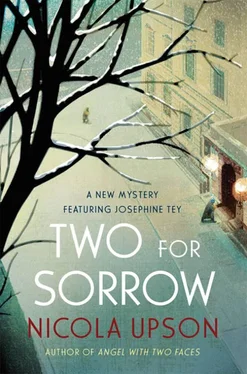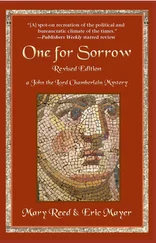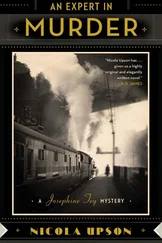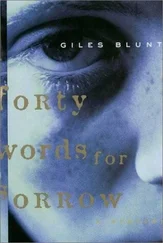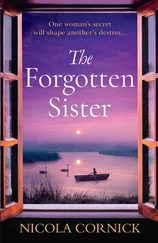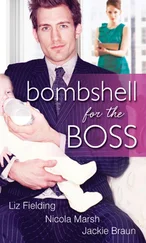‘It’s not so bad,’ Lucy said defiantly. ‘I’ve got somewhere to live and a bit of money coming in.’
‘Yeah, and for that you’re supposed to spend every waking hour being grateful to them. Have you forgotten all those things we talked about? A flat of our own one day, flowers on the table and friends to visit. A gramophone. The odd trip to the pictures, even?’ Lucy began to smile again. ‘That’s better,’ Marjorie continued. ‘There’s no one in the world who can stop us having that if we’re clever.’
‘I suppose not, but won’t you even tell me what you’re up to?’
‘Best that you don’t know at the moment. But you trust me, don’t you?’
Lucy nodded reluctantly. ‘I’d better get back,’ she said. ‘I don’t want any more trouble today.’
Marjorie gave her a hug, and they walked back towards the club. ‘Looks like you got out just in time, Luce,’ she said, glancing across the road to where a middle-aged man was getting out of a car. ‘That’s a copper if ever I saw one.’ Lucy followed her gaze, and Marjorie saw the fear return to her eyes. ‘Chin up, girl,’ she said. ‘You’ll be all right. There’s nothing else dodgy in your room, is there?’ Lucy shook her head. ‘Good—then you’ve got nothing to worry about. Is it your afternoon off tomorrow?’
‘Yeah, I’m off at one.’
‘Then I’ll meet you here and we can go for a walk. I might have some good news for you by then.’
‘News about what?’
‘About our future.’ She threw the end of her last cigarette on to the pavement and ground it under her shoe, then kissed Lucy quickly on the cheek. ‘Start making a list of films you’d like to see,’ she called back over her shoulder.
‘Tell the sergeant I’ll be with him in a few minutes.’ Celia Bannerman put the receiver back on its cradle and sighed heavily. Miss Timpson’s announcement of Scotland Yard in her foyer felt like a personal blow, and she did not need the disapproval in the receptionist’s voice to tell her that a policeman’s arrival undermined everything she had done for the Cowdray Club over the years, and threatened all that she still hoped to achieve. She had had no choice but to involve the police—the women who had received the letters had insisted on it—but, now they were here, a process had been set in motion which was no longer entirely under her control and she felt uneasy, perhaps even a little afraid. How many of those women would thank her, she wondered, when their privacy was disturbed, their pasts raked over? Surely she was not the only one who had done things in her life which she regretted? And even if the matter was resolved satisfactorily, the fact that she had allowed it to arise at all would still hang over her as a mark of failure, proof that she was undeserving of the trust which Lady Cowdray had placed in her.
She would have to tell the president, of course. Although the club functioned independently, it was linked to the College of Nursing by funding and by reputation, and any trouble in one body would soon seep through to the other. She was lucky that she had been able to contain it until now, but the last thing she needed was for Miriam Sharpe to bump into Scotland Yard with no warning. They came from two different sides of nursing: Sharpe was a hands-on traditionalist through and through, scathing about so many of the changes that had taken place in medicine over the years, and they had never had an easy relationship. While Lady Cowdray was alive, she had harnessed their different skills into a fragile but effective alliance; now, their differing viewpoints hovered constantly on the brink of outright animosity. But Celia was on the defensive here and she should, out of courtesy, give Sharpe the opportunity to sit in on the discussion she was about to have. Reluctantly, she picked up the telephone.
‘Miriam Sharpe.’
‘Miriam—are you free at the moment? I need to speak to you urgently—can I come and see you on my way downstairs?’
‘Don’t bother, Celia—I was just on my way up to you.’
The line went dead and, less than a minute later, there was a knock at the door. ‘Come in,’ Celia called, but the president of the College of Nursing was not in the mood to wait for an invitation. She strode across the room, ignoring the chair that was offered to her, and threw a copy of The Times across the desk. ‘What is the meaning of this?’ she asked, her face white with rage.
‘It’s an advertisement for the gala.’
‘I know what it is—and it’s bad enough that you deprive nurses of their economic and professional independence by seeking charity at all, but to raise it in their name without mentioning that the proceeds are to be siphoned off into a private women’s club is despicable beyond belief.’
‘Oh for God’s sake—nothing is being “siphoned off”, as you put it. We’re raising money to support two mutually dependent organisations,’ she added, deciding that now was not the best time to admit that further funds were to go to the Actors’ Orphanage in order to secure Noël Coward’s support for the gala. ‘You make it sound like fraud.’
‘That’s exactly what it is. Can you honestly tell me that people reading this won’t suppose that their money is going directly to support the everyday needs of our nurses? It’s worded deliberately to suggest that.’
‘The whole purpose of the club is exactly what you’ve just mentioned. Aren’t nurses allowed to enjoy a little relaxation and luxury? Don’t you think they work more effectively and with a better heart if they’re offered that? You’re behind the times, Miriam—they’re women, not machines. It’s not like it was when we were young.’
‘Oh? So what’s changed? The dedicated are still trodden on or passed over, just like they always were. It was exactly the same after the war—how much of the money raised to support nurses in distress actually went to them? It was all put into bricks and mortar or administration. When will you realise that we’re tired of being thrust forward as some sort of unblushing mendicant every time funds are needed? There’s no room for politics in nursing, and there never will be.’
‘You really expect me to believe that you’re oblivious to the value of politics? All those letters to The Times haven’t come out of thin air. You’re behind them, any fool could see that you’ve virtually just quoted them word for word. But if you think I’ll allow you to split this place down the middle, then you’re mistaken.’ She took a deep breath and tried to control herself before she really went too far: she hadn’t wanted to antagonise Sharpe—it would only make things worse when she told her who was waiting downstairs. ‘Anyway, I didn’t call you in for that,’ she said impatiently. ‘I’m sorry to say that we’ve had a number of thefts in the club, and one or two members of the committee have received some unpleasant letters—anonymous ones. Obviously it doesn’t affect the college, but I’ve had to call the police in and I thought you should know.’
‘Doesn’t affect the college? How can you say that? You’re even more deluded than I thought you were, Celia. Of course it affects us—that sort of notoriety doesn’t stay conveniently in a box just because you’d like it to.’
‘You’re blowing it out of all proportion. It’s simply …’
‘It’s simply that you decided to bring ex-prisoners into this organisation. I told you what would happen if you did, but you wouldn’t listen. Once more, nurses have to be guinea pigs in your precious rehabilitation schemes.’
‘There’s no reason to suppose that any of the Holloway girls are behind either the thefts or the letters, although of course we’ll look into it.’
Читать дальше
